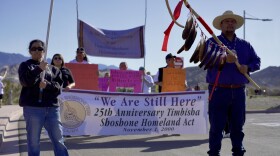Sometimes, it's not about the human perspective.
At least, that's what Ka-Voka Jackson thinks about the reason she travels to remote areas of her ancestral Hualapai land to re-introduce native flora.
Jackson is working on her Master's of Science degree in the School of Life Sciences at UNLV and jumped on board with a project to merge culturally important plants into her research.
A Native American who grew up on the Hualapai Reservation, Jackson and fellow students travel to remote areas of the region, via car and boat on the Colorado River, to replace invasive ravenna grass weeds with white sagebrush and other native plants.
Ravenna grass has slowly been stifling the plants that are central to the culture, religion, and history of Jackson's Native American ancestors. The non-native grasses provide fuel for fires and are not eaten by animals in the area. With nothing holding them back, they're taking over areas of the Southwest from native flora.
“When we’re out there, my up most hope is to see a really healthy ecosystem where there’s a lot of native vegetation and not that many invasive species but the reality is there are invasive species there,” she said.
This summer she will be returning to plots of land where she and fellow students planted natural species to see if her efforts have paid off. She said she feels a special connection to the areas where she travels and feels a need to preserve and protect them.
“I have a deep connection to the area and to nature itself," She said, "I want to be out there and help preserve that and bring it back to as healthy of an ecosystem as it can be,” Jackson said.
While Jackson and the members of her tribe lead thoroughly modern lives, the plants used by their ancestors are still important to them culturally.
“All the native vegetation we deal with are really important to the culture because for us and our lifestyle both historically and modern," Jackson said, "It’s not that we just use these plants and go on with our lives. They are part of our everyday use.”
She hopes she cannot only restore areas of Glen Canyon back to a natural desert ecosystem but that she can involve her tribe and others in her efforts.
“My personal goal with this project, besides gaining my master’s degree, is to involve tribes more with this kind of work,” she said.
Jackson's graduate research is conducted in a partnership with the National Park Service in Glen Canyon National Recreation Area.
Ka- Voka Jackson, Master's of Science student in life sciences, UNLV









